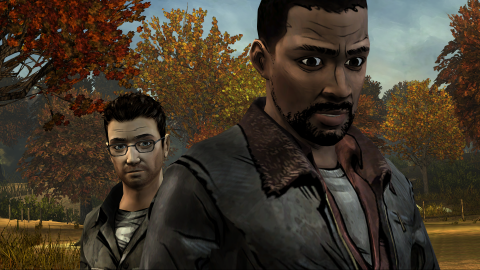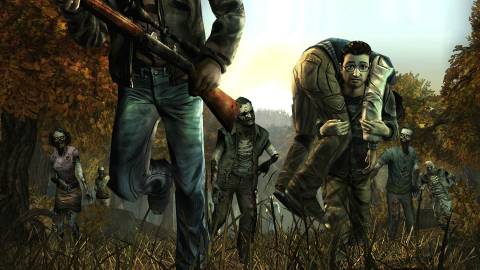Robert Kirkman's The Walking Dead comic series has proved a remarkably pliant property in recent years. The comic is still going strong over 100 issues in, and the TV series loosely based upon it, despite some serious second-season hiccups, is finding new life in its third season. All this, despite an overwhelming sense of malaise related to all things zombie in pop culture these days. Granted, zombies are pretty much everywhere, and while they make for serviceable villains in just about any context, there are only so many ways you can stab, shoot, bludgeon, beat, kick, squash, crunch, or set alight the undead. They're always going to be screeching, gurgling ghouls who want to eat you, and the thrill of killing them can really only take you so far.

This is what makes Telltale's The Walking Dead such a marvel. Seemingly aware that the mere act of killing zombies is hardly enough to capture anyone's attention nowadays, lead writer/directors Sean Vanaman and Jake Rodkin have smartly focused the game on the human story of the zombie apocalypse. This is certainly in the tradition of Kirkman's writing of the comic books, but this Walking Dead tale is arguably even more gripping than Kirkman's own works. This Walking Dead puts you right in the middle of the fray as society buckles under the weight of the dead rising, and forces you to make tough decision after tough decision not only to survive, but to help others survive as well.
Split up over five episodes, the first season of The Walking Dead puts you in the shoes of Lee, a convicted murderer who may or may not actually be all that bad of a guy. You don't know, because the game is purposefully vague about your back story, perhaps so as to allow some malleability in how players see themselves. Lee is you, but Lee is still a character who speaks, emotes, and has his own distinct personality. That his dialogue choices in nearly every scenario allow for a range of responses means you can mold Lee to your play style. He's essentially a silent protagonist with a voice, if that makes any sense at all. That his voice can be so easily adjusted to your own style is a compliment to the writing, which is as mature and thoughtful as anything I've played in recent memory.
Over the course of the five episodes, Lee is joined by a variety of other survivors of the zombie apocalypse, some of which stick around for the duration of your journey, and some who simply appear for an episode or two and then are dispatched, either of their own volition, or by way of some grisly demise. One character who is a constant is Clementine, an eight-year-old girl who Lee stumbles upon in her otherwise abandoned suburban home early in the first episode. When you meet her, Clem is just a particularly vulnerable survivor, completely alone and terrified. Her parents were out of town when the outbreak hit, and until you come upon her, she'd barely had any human contact. No matter how you play Lee, it becomes apparent that this child is going to become your responsibility.
And what a wonderful, heart-wrenching responsibility she turns out to be. It is with no amount of exaggeration that I say that Clementine is one of the most fully-realized, brilliantly written child characters ever put into any kind of entertainment medium. Children are often impossible to write, given their innocence, capriciousness, and general inability to understand the world around them. Make them too dumb, and they become a shrill annoyance. Make them too clever, and they become cartoon characters. Clem is neither of these things. She is a kid who is at once capable, but deeply unsure of herself. She, like Carl from the Walking Dead comics, is forced into a situation where she must grow up entirely too quickly. That her upbringing into this ludicrously dangerous world is your responsibility is a gamble by the game's writers that brilliantly pays off. Not only do you want to protect this girl, you want to help her every way you possibly can. When that safety is threatened, it's not just Lee's on-screen anger that resonates. You feel it too.
What you have to do to keep her safe becomes increasingly grotesque and horrifying as the season wears on. Much as the comic rarely shied away from making characters do terrible things to survive, the game forces you to make constant life or death choices that can easily result in characters you like dying terrible deaths.

Choice. It's an interesting buzzword in gaming that too often boils down to a meaningless, binary path selection. If I choose A, I get this ending, and B, this other ending. The Walking Dead has these moments, but more often choice comes in the form of smaller decisions that nonetheless can have grave impact on your ability to move forward. Even your choice of tone in dialogue with other characters can have an effect on how other characters react to you in subsequent episodes. You can be the selfless hero, the selfish dick, or some amalgamation of the two. Regardless, those choices will add up over time.
Of course, the main story is always going to play out the way it's going to play out. While you can affect endings, who lives or dies, and how people interact with you, the truth is that the larger scope of the story is very much out of your hands. After all, this is a work of fiction, and as a result your choices still have to work within the machinations of the game's (apparently huge) script. In a sense, The Walking Dead is almost like an examination of fatalism. You can choose whatever path you like, but in the end, the larger world around you is going to do what it's going to do. All you can truly hope to affect is how you get to that end, and how you spend your time with others who may or may not be fated to survive.
Those choices prove a remarkable source of tension in a game that already has plenty of walking, slobbering, biting sources of tension. Ultimately, The Walking Dead treats its zombie antagonists the way the comic and TV series has--a deadly nuisance. Zombies are sentient weeds to be plucked, or simply walked around. That makes them no less dangerous, mind you, and the game certainly has plenty of breath-holding moments featuring Lee and other characters struggling against hordes of the undead. But more often, the tension comes from interactions with other people, be they fellow friendly survivors, or unfriendlies who regrettably cross your path. The choices you're forced to make in how you deal with these people is The Walking Dead's greatest fount of dread and terror. Even simple dialogue choices often left me pondering far longer than I ever expected.
To dig too deeply into the individual choices you will make is to dig up too many potential spoilers. Suffice it to say, each episode requires some tough thinking, and no matter what you choose, not everyone will survive. In this regard, Telltale's traditional episodic structuring is something of a blessing. Trying to play the entirety of season one in a single sitting is an incredibly draining experience. Emotions run high throughout each episode, which individually clock in between 90 minutes to three hours apiece. Each story is like its own individual tale, spun as part of a larger anthology. The second episode, for instance, is practically a self-contained story featuring multiple characters who never reappear, but nonetheless have a great deal of effect on what happens afterward. The writing and voice acting remains sharp throughout. Though some episodes are certainly better than others, there isn't a bad one in the bunch.
What's interesting is that very little about what makes The Walking Dead so special comes from the act of actually playing it. There's no secret sauce here that differs from Telltale's other point-and-click adventure games, save for the copious amounts of blood everywhere. You're still exploring environments, solving light puzzles, and occasionally engaging zombies that get a bit too close. But those mechanics are simple, generally uninvolving, and only occasionally frustrating. If anything, the choices and dialogue trees are the core of The Walking Dead's gameplay. Everything else is just necessary machinery to make it go.

Sometimes that machinery does falter, though only rarely. Though the game's cel-shaded art style looks terrific on every platform, the console versions of the game are definitely prone to frame hitch-ups and occasional crashes, at least in my experience. I did most of my playing on the PC, which generally seems to be the best version, though some players have reported issues with saves wiping between episodes on that platform. I never experienced this myself, but it's been reported pervasively enough that I feel it warrants a mention. This is one of those cases where I feel the quality of content is worth the risk of potential technical hurdles, no matter which platform you choose to play on.
Yes, The Walking Dead really is that incredible. Relying so heavily on the writing, atmosphere, and emotional content of a game to carry you through a five-episode season is a risk that has paid tremendous dividends for Telltale. The Walking Dead is no mere interactive story. It is an immaculately paced, painfully affecting story featuring some of the most lovingly crafted characters ever to appear in a video game. From the very beginning, The Walking Dead sinks its teeth in and never lets you go. It's a journey in the truest sense of the word, replete with tragedy, heartache, tension, fear, and even brief moments of catharsis. Calling The Walking Dead a work of entertainment almost seems like a misnomer, considering the heavy tone and general lack of sentimentality in the writing. This is a sad game that will weigh heavy on you long after you've completed it--it even wrung some honest tears out of me on a couple of occasions. But you'll suffer through the emotional swings because they're ultimately worth it. No matter how depressing, gut-wrenching, or flat-out horrifying The Walking Dead gets, you will want--nay, need--to finish it. It's just that good.
